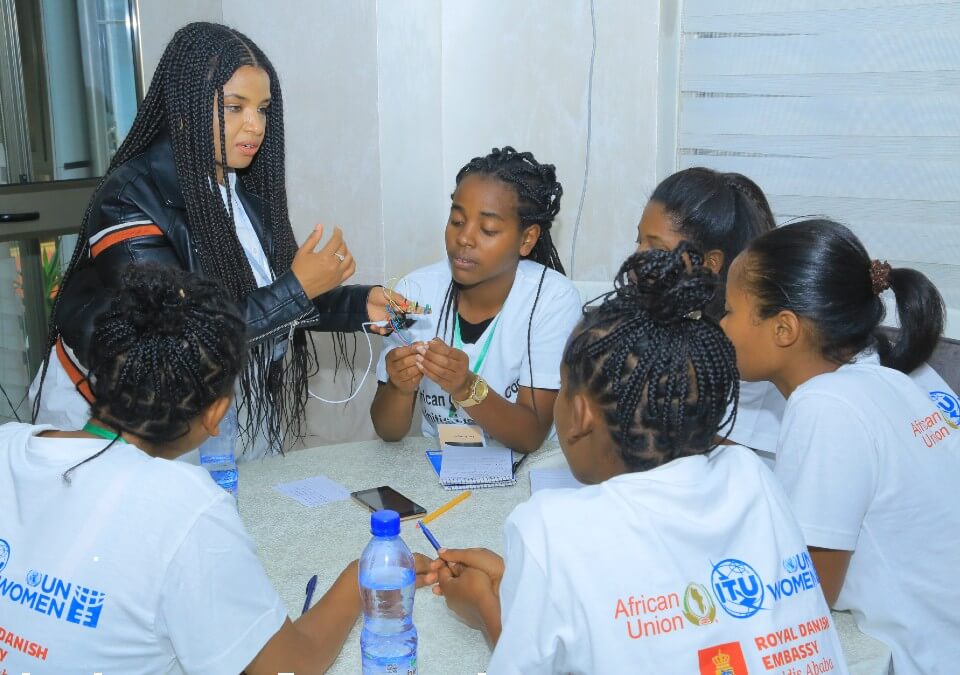Partners of “African Girls Can Code” commit to address the digital gender divide in Africa
Date:

Half of the 3.7 billion people who do not yet have access to internet are women. And while in some parts of the world the digital gender divide has been shrinking in recent years, it is growing in Africa, data shows.
To fill the digital gap in Africa, UN Women partnered with the African Union Commission (AUC) and the International Telecommunication Unit (ITU) in a bold initiative to train girls from the African continent how to code. Launched in 2018, the first phase of the African Girls Can Code Initiative (AGCCI) has trained 600 girls, developed a guide on mainstreaming ICT, gender and coding in national curricula across the continent, launched an eLearning platform and hosted a series of webinars to keep the learning going amidst the pandemic. The partners are now planning the second phase of the Initiative, engaging new strategic partnerships with the African Union International Centre for the Education of Girls and Women in Africa (AU/CIEFFA), the Economic Commission for Africa (ECA), the African Development Bank, the United Arab Emirates and telecom companies.
To take stock of the initiative in view of its second phase, on 21 March 2021 UN Women convened a virtual multi-stakeholder policy dialogue in collaboration with AUC, ITU, the UN Economic Commission for Africa and the Danish Embassy in Ethiopia. The dialogue brought together some 60 participants, including 15 young girl coders and partners from AU Member States, the UN system and the private sector committed to promote the role of girls and young women in innovation and development in Africa amidst the COVID-19 pandemic.
In her opening remarks Cisse Mariama Mohamed, Director of Health, Humanitarian Affairs and Social Development at AUC, highlighted that “online child sexual exploitation is rising in Africa due to remote learning and a combination of rapidly rising connectivity, limited regulation, little awareness, and poverty.”
“In spite of this, let us encourage our young girls, the AGCCI young female Ambassadors to utilize the knowledge they gained from the Initiative to come up with innovative and targeted solutions to the problems that continue to affect them and their communities daily,” Mohamed said.
Jean Paul Adam, Director of the Technology, Climate Change and Natural Resources Division of the ECA stressed the need to adapt the initiative to the current crises: “As we face the unprecedented crisis imposed on us by the global pandemic, and we seek to adapt and build resilience to a worsening climate crisis, we are more conscious than ever before of the need for us to not just return to the status quo. We need to build forward better.”
Andrew Rugege, Regional Director with ITU, highlighted the importance of partnerships in accomplishing the colossal task of connecting the world and achieving gender equality, noting that “addressing this gender gap can create significant business opportunities for the continent. It is estimated that closing the gender gap just in mobile ownership and data usage in low- and middle-income countries could generate an annual USD 15 billion in revenue.”
The discussion yielded strategic partnerships with stakeholders from the private sector such as Microsoft and Orange Africa, who expressed interest in addressing the digital gender divide through advocacy campaigns to address cultural misconceptions across Africa and funding training centers that ensure equitable participation of young women and men. AU/CIEFFA shared its commitment to support grassroots initiatives.
Moreover, the dialogue provided a platform for the girl coders to share their experience on how they have used the skills acquired through the programme to contribute to COVID-19 response and related challenges in their respective countries.
UN Women’s Representative to Ethiopia Letty Chiwara closed the dialogue calling for renewed commitment to this important initiative: “To ensure the full-fledged participation of women and girls in STEM, we need to design sustainable initiatives that empower girls through training and mentorship and encourage them to pursue leadership positions in science careers. Supporting Girls in Science today means they mentor more girls tomorrow.”